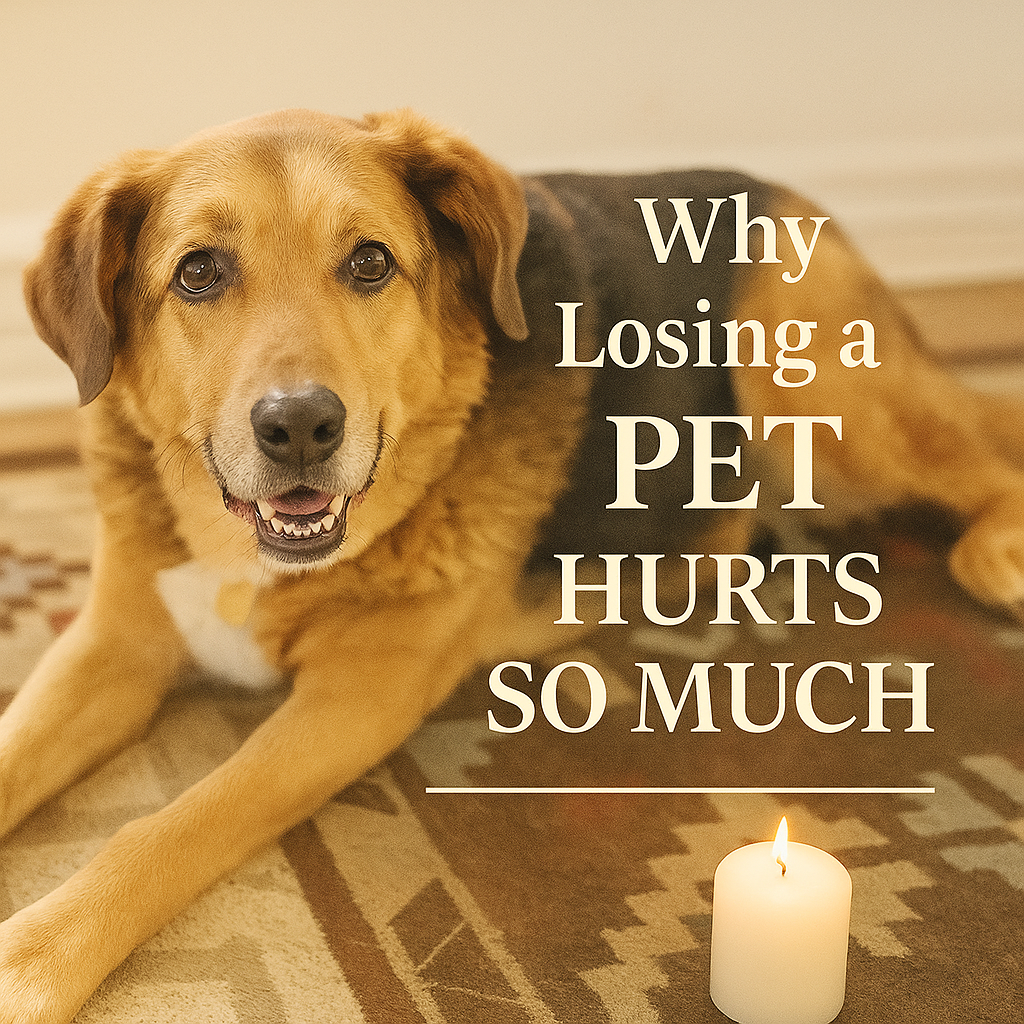Why Losing a Pet Hurts So Much
If you’ve ever lost a beloved animal companion, you know the depth of that grief. It can be overwhelming, disorienting, and lasting. And yet, in a society that often downplays or misunderstands pet loss, it’s easy to feel like you must minimize your pain or move on before you’re ready.
But the truth is simple and profound… Losing a pet hurts so much because the love runs so deep. And that love is unlike anything else in our lives.
🐾 The Human-Animal Bond Runs Deep
The American Veterinary Medical Association (AVMA) defines the human-animal bond as a mutually beneficial and dynamic relationship between people and animals, one that’s influenced by our behaviors, emotions, and well-being. This bond often begins the moment we welcome an animal into our home. Over time, they become more than pets. They become companions, confidants, and family.
Our animals celebrate with us, comfort us, and witness our lives in intimate, unspoken ways. They know our routines, our moods, and even our stillness. And we, in turn, learn to read the flick of their tail or the glance of their eyes as fluently as any spoken language.
This bond is rooted in trust, shaped by love, and held together by the invisible thread of daily life.
💔 Why the Grief Feels So Sharp
The pain of pet loss isn’t “just” about losing a dog, cat, bird, or other animal. It’s the loss of a relationship that is often pure, uncomplicated, and constant, something we rarely experience in human connections. Several factors make this grief especially powerful:
1. They Depend on Us, Utterly and Fully
Our animals rely on us for everything: food, safety, comfort, love. That dependence creates a deep, protective connection—and a profound sense of responsibility. When they die, we often carry not just grief, but guilt. Did I do enough? Was it the right time? Did they know how much I loved them?
Especially in cases of euthanasia, we may feel like it was our decision that ended their life, even when it was made from compassion and love. That kind of responsibility can weigh heavily on the heart.
2. They Love Without Judgment
Animals don’t argue with us, shame us, or criticize us. They don’t care about our titles, our mistakes, or the masks we wear. Their love is freely given and unconditional.
Because of this, our pets often become the ones who see us at our most vulnerable—when we’re exhausted, crying, scared, or simply being our unfiltered selves (good or bad). To lose that kind of witness is to lose a rare kind of safety.
3. They Are Woven into Our Routines
Feeding, walking, snuggling, grooming… our daily rituals with our animals become part of the rhythm of our lives. When they’re gone, those routines fall away too, creating a silence and an absence that can feel unbearable. The house feels emptier. The calendar has gaps. The habits we built in love now echo with loss.
4. The Grief Is Often Disenfranchised
In our culture, pet loss is a form of disenfranchised grief, a term coined by grief expert Kenneth Doka to describe grief that isn’t acknowledged, validated, or supported by society at large. There’s often no funeral, no paid time off, and no formal space to mourn. Friends or coworkers may not understand. Some may even suggest, “It was just a dog,” or “You can get another one.” But grief doesn’t work like that. Love isn’t replaceable. And when grief is disenfranchised, it can become isolating.
5. Grief Is Deeply Personal
Your experience of loss is shaped by your own history with pets, with grief, and with relationships. Maybe your pet saw you through a divorce or a move. Maybe they were your lifeline during a particularly dark season. Maybe they were the one being who never left. No one can measure that bond for you. And no one can tell you how to grieve it.
🌿 A Different Kind of Goodbye
One of the hardest parts of grieving a pet is that we often lack the rituals and support systems we use for human loss. But your grief is real, and it matters.
Some ways people honor the lives of their beloved animals include:
Creating a small memorial or altar.
Writing a letter to their pet.
Planting native flowers or trees in their memory.
Holding a crossing-over ritual or vigil.
Talking to others who understand this kind of loss.
Joining a pet loss support circle or working with a grief companion.
There is no timeline for this kind of mourning. There is only tenderness, and time, and the slow process of integrating the loss into your life.
🕯️ You’re Not Alone
If you are grieving for a pet right now, please know this, you are not alone, and your love was not ordinary. The pain you feel is in direct proportion to the depth of that love, and that is something to be honored, not hidden.
At Life and Death Services, we understand how profound the loss of a pet can be. Whether you need a compassionate listener, a pet loss support group, or a simple ritual to say goodbye, I would be honored to walk beside you.
Because love like this doesn’t disappear. It transforms. And sometimes, it needs a little help finding its way to that resolution.

